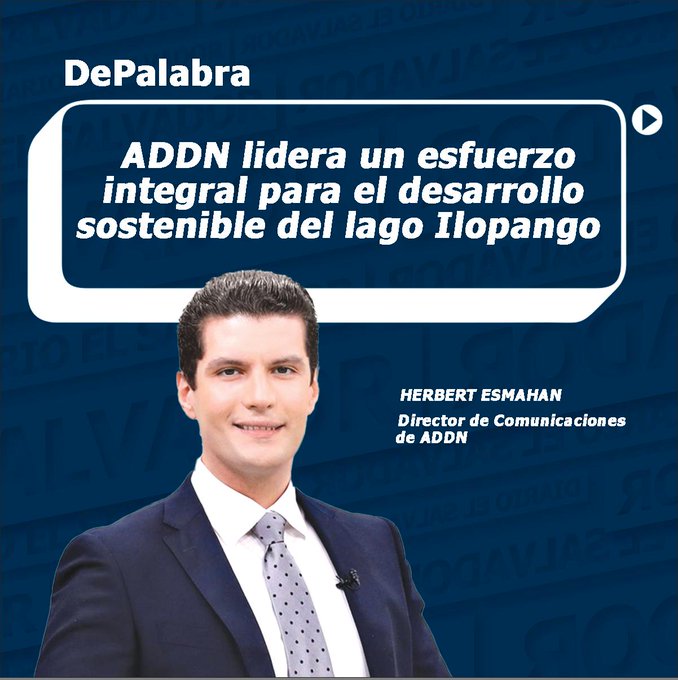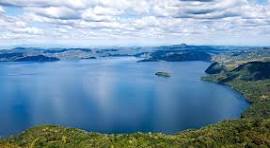 Diario a major newspaper of El Salvador published this piece on October 12, 2024:
Diario a major newspaper of El Salvador published this piece on October 12, 2024:
The National Development and Design Agency (ADDN) is leading an innovative initiative that seeks to ensure the sustainable development and conservation of Lake Ilopango, one of the most important natural resources in El Salvador. This ambitious project, led by ADDN Director Dave Rivard, unites executive government institutions, NGOs, local governments and landowners in a joint effort to protect the lake’s ecosystems and promote responsible economic growth.
Lake Ilopango has faced serious problems of pollution and environmental deterioration over the years. Poor solid waste management practices, deforestation and lack of control over tributaries have contributed to its degradation. Previous governments did little to address these problems, ignored the need to protect the environment and never cared about the future of the country’s natural resources. This left Lake Ilopango in a critical situation, reflecting the neglect that has characterized past efforts.
Under Rivard’s leadership, the ADDN has become a key pillar of government integration. ensuring that diverse institutions work hand in hand to acheive common goals. Unlike previous governments, which acted without proper coordination, President Nayib Bukele’s government is doing what many have never done: integrating and coordinating efforts for truly sustainable development.
Dave Rivard, known for his commitment to environmental preservation, sees this project not only ss an ecological mission, but also as a reponsibility to protect El Salvador’s natural heritage. The natural environment that exists today is a remnant of the inheritance that God has left us,” Rivard has stated. “We must not only protect what remains, but we must restore it, but we can only do so by working together as one big family” using shared resources, our collective heritage.”
 The vision that Rivard has promoted under the ADDN, called “Alliances for Survival in the 21st Century,” seeks to create an integrated management plan for the Lake Ilopango basin. This effort will benefit more than 400,000 residents in six municipalities directly connected to the lake and two other municipalities that control its tributaries. The eight municipalities involved are San Salvador Sur, San Salvador Este, Cuscatlán Sur, Cuscatlán Norte, San Vicente Sur, San Vicente Norte, La Paz Centro and La Paz Oeste.
The vision that Rivard has promoted under the ADDN, called “Alliances for Survival in the 21st Century,” seeks to create an integrated management plan for the Lake Ilopango basin. This effort will benefit more than 400,000 residents in six municipalities directly connected to the lake and two other municipalities that control its tributaries. The eight municipalities involved are San Salvador Sur, San Salvador Este, Cuscatlán Sur, Cuscatlán Norte, San Vicente Sur, San Vicente Norte, La Paz Centro and La Paz Oeste.
The collaborative framework has been designed with the participation of key instututions such as the Salvadoran Water Authority (ASA), the National Administration of Aqueducts and Sewers (ANDA), and the Ministry of Environment and Natura; Resources (MARN), among others. This comprehensive approach is what makes the ADDN a centerpiece in the current government structure, ensuring that the sustainable use of the lake’s resources is a shared priority. Thanks to this inter-institutional integration, an improvement in the water quality of Lake Ilopango has been observed, as a result of coordinated actions to clean up tributaries and control solid waste. These actions have begun to restore the health of the lake’s ecosystem
The project began with the technical assistance of the Prolago association, specialized in territorial planning of wetlands. Based on scientific studies and the Strategic Plan for the Sustainable Development of Lake Ilopango, the foundations for long-term conservation and management have been established. In addition, recent studies on biodiversity, water quality monitoring and solid waste management have been incorporated, ensuring that all actions are based on the most up-to-date data. In recent months, the ADDN has organized multiple inter-institutional meetings to coordinate strategic actions that promote sustainable management of the basin. ADDN officials have visited the eight municipalities of the basin, promoting active collaboration between the agency, the Executive and the mayors. These visits have been essential to align efforts and ensure that the policies and projects designed protect the lake’s ecosystems while promoting regional economic development.
 “The Ilopango Lake project reflects the problems inherited from previous administrations, which never cared about the country or its sustainability,” said Rivard, highlighting the seriousness of the unsustainable practices that must now be corrected. “The lake basins are a visible example of the effects of past governments that acted without prudence in these matters, leaving us with challenges that we are solving today.”
“The Ilopango Lake project reflects the problems inherited from previous administrations, which never cared about the country or its sustainability,” said Rivard, highlighting the seriousness of the unsustainable practices that must now be corrected. “The lake basins are a visible example of the effects of past governments that acted without prudence in these matters, leaving us with challenges that we are solving today.”
One of the main objectives of the initiative is to develop a recognized mechanism for the management of lake basins in El Salvador. This governance model would ensure that land use practices, environmental protection and economic development are coordinated within a balanced framework. The project will also evaluate the current legal frameworks to propose improvements that ensure long-term sustainability.
Key aspects of the project:
Beneficiaries: more than 400,000 inhabitants in the eight municipalities of the basin.
Collaborating institutions: ASA, ANDA, Prolago, MARN, ADDN, MAG, Mitur, MIVI, Minsal, Cendepesca, and several NGOs.
Project duration: from April 2024 to the present.
The sustainable development of Lake Ilopango represents a model for the future of environmental management in El Salvador. Through collective action, this project demonstrates that ecological conservation and economic growth can go hand in hand, ensuring that El Salvador’s natural resources are protected for future generations.


